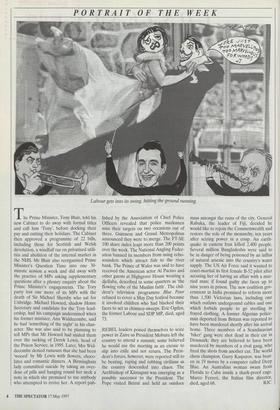PORTRAIT OF THE WEEK
Labour gets into its swing, hitting the ground running.
The Prime Minister, Tony Blair, told his new Cabinet to do away with formal titles and call him 'Tony', before docking their pay and cutting their holidays. The Cabinet then approved a programme of 22 bills, including those for Scottish and Welsh devolution, a windfall tax on privatised utili- ties and abolition of the internal market m the NHS. Mr Blair also reorganised Prime Minister's Question Time into one 30- minute session a week and did away with the practice of MPs asking supplementary questions after a phoney enquiry about the Prime Minister's engagements. The Tory party lost one more of its MPs with the death of Sir Michael Shersby who sat for Uxbridge. Michael Howard, shadow Home Secretary and candidate for the Tory lead- ership, had his campaign undermined when his former minister, Ann Widdecombe, said he had 'something of the night' in his char- acter. She was also said to be planning to tell MPs that Mr Howard had misled them over the sacking of Derek Lewis, head of the Prison Service, in 1995. Later, Mrs Wid- decombe denied rumours that she had been `wooed' by Mr Lewis with flowers, choco- lates and romantic dinners. A Birmingham lady committed suicide by taking an over- dose of pills and hanging round her neck a note in which she promised to sue anybody who attempted to revive her. A report pub- lished by the Association of Chief Police Officers revealed that police marksmen miss their targets on two occasions out of three. Guinness and Grand Metropolitan announced they were to merge. The FT-SE 100 share index leapt more than 200 points over the week. The National Angling Feder- ation banned its members from using echo- sounders which attract fish to the river bank. The Prince of Wales was said to have received the American actor Al Pacino and other guests at Highgrove House wearing a djellaba, described in some quarters as 'the flowing robe of the Muslim faith'. The chil- dren's television programme Blue Peter refused to cover a May Day festival because it involved children who had blacked their faces to act as chimney-sweeps. Eric Ogden, the former Labour and SDP MP, died, aged 73.
REBEL leaders poised themselves to seize power in Zaire as President Mobutu left the country to attend a summit; some believed he would use the meeting as an excuse to slip into exile and not return. The Presi- dent's forces, however, were reported still to be beating, raping and robbing civilians as the country descended into chaos. The Archbishop of Kisnagani was emerging as a possible successor to the President. The Pope visited Beirut and held an outdoor mass amongst the ruins of the city. General Rabuka, the leader of Fiji, decided he would like to rejoin the Commonwealth and restore the role of the monarchy, ten years after seizing power in a coup. An earth- quake in eastern Iran killed 2,400 people. Several million Bangladeshis were said to be in danger of being poisoned by an influx of natural arsenic into the country's water supply. The US Air Force said it wanted to court-martial its first female B-52 pilot after accusing her of having an affair with a mar- ried man; if found guilty she faces up to nine years in prison. The new coalition gov- ernment in India promised to reform more than 1,500 Victorian laws, including one which outlaws underground cables and one which forbids people to go strolling in frayed clothing. A former Algerian police- man deported from Britain was reported to have been murdered shortly after his arrival home. Three members of a Scandinavian `biker' gang were shot dead in their car in Denmark; they are believed to have been murdered by members of a rival gang, who fired the shots from another car. The world chess champion, Garry Kasparov, was beat- en in 19 moves by a computer called Deep Blue. An Australian woman swam from Florida to Cuba inside a shark-proof cage. Marco Ferreri, the Italian film director,


































































 Previous page
Previous page